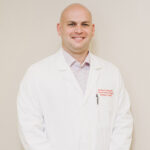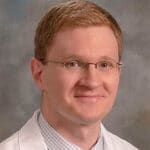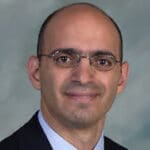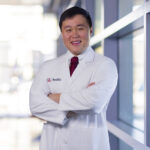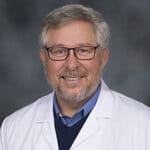Request an appointment with the UofL Health – Reflux, Swallowing and Hernia Center by calling 502-588-4571. Our nurse navigator, Kelsey Schneider, is available to assist you with any questions and get you scheduled with our specialists.
What is Reflux?
Heartburn or regurgitation may be caused by acid reflux, also known as gastroesophageal reflux (GERD). This is a digestive disease where stomach contents, especially acid, backflow into the food pipe. It is more common as we age but can happen to many people of younger age as well.
How is Reflux Diagnosed?
The following procedures may be used to diagnose reflux:
- Manometry (measures the strength and muscle coordination of your esophagus when you swallow)
- Esophageal pH monitoring/wireless esophageal pH monitoring/impendence reflux monitoring (measures how often stomach acid enters the esophagus)
- Upper gastrointestinal endoscopy (visually examines your upper digestive system)
What are the Treatment Options for Reflux?
Lots of medical options are available in the management of GERD. Our doctors are comfortable with the management of patients who require acid-suppressing medications but also work routinely with patients to reduce medications, where possible, and find alternative solutions for individuals for whom traditional medication is not working.
When medications fail, our surgeons are available to treat patients appropriately. Surgical procedures include:
- Hiatal hernia repair
- Nissen fundoplication
- Magnetic sphincter augmentation of the lower esophageal sphincter
What is reflux?
Often reflux and GERD and heartburn are used as if they are the same. However, Gastroesophageal reflux disease (GERD) is the result of reflux over time and is a disease. Heartburn is a symptom; this means that you can have heartburn without having GERD. In fact, one of the primary jobs of practitioners is to determine if a person’s symptoms are truly related to reflux. So what’s reflux? Reflux is a general term practitioners use to describe what happens when contents come from a person’s stomach into their esophagus (swallowing tube that transports food from the mouth to the stomach).
Does everyone have reflux?
It is not very common for a person to not have any reflux events during the course of a normal day. The issue starts when reflux happens more or when a person starts having symptoms.
What are the symptoms of reflux?
Different people have different symptoms. Some individuals have “classic” heartburn, which they describe as a burning sensation directly behind their chest bones. However, many people will say that they have regurgitation of acidic contents into their mouth. Still other patients complain of chest pain. A very frequent question we get is whether symptoms of cough, for example, or hoarseness are caused by reflux disease. That is one of the primary activities of a center like the Reflux, Swallowing, and Hernia Center: to determine how bad someone’s reflux is and whether or not their symptoms can be explained by reflux so that the right treatment can be found.
What is GERD?
GERD (gastro-esophageal reflux disease) happens when acid from the stomach, or stomach contents, move up the food pipe and cause inflammation of the inner lining of the esophagus.
How do you treat GERD?
GERD can be treated with antireflux medications (proton pump inhibitors) or with surgery.
If I have not responded to common medications does that mean I need surgery?
Not necessarily. Although surgery can be a good option for the right patient, our center can also work with patients to find other solutions to potential reflux-related symptoms. The decision about surgery is made with the patient at the center of a multidisciplinary team, comprised of both Surgeons and Gastroenterologists. If it is decided that surgery is not right for a patient, the team will continue to work using medications or other therapies until symptoms have improved.


 UofL Health – Chestnut Street Outpatient Center
UofL Health – Chestnut Street Outpatient Center